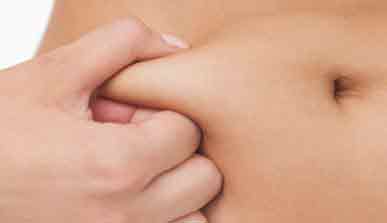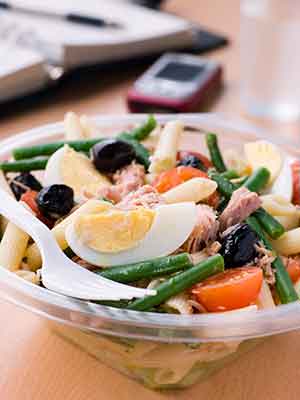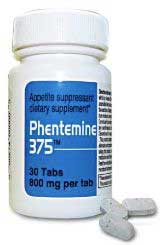 Not too long ago I would have screamed from the rooftops that crash-dieting will only make you pile the weight back on as soon as you come off it. I would have said that moderate, gradual weight loss would keep the fat at bay more successfully in the long run.
Not too long ago I would have screamed from the rooftops that crash-dieting will only make you pile the weight back on as soon as you come off it. I would have said that moderate, gradual weight loss would keep the fat at bay more successfully in the long run.
Scientific research in this very area seems to disagree: according to a recent study, neither the group of crash dieters nor the gradual dieters put the weight back on faster than the other. In fact, both groups put the weight back on fairly equally.
But, hold on. Don’t run off and start crash dieting just yet, because when you dig a little further there is more to the story. Isn’t there always!
Early Days Yet
 The study I’m referring to is the first randomized trial to actually look at the comparison in detail, and while its results are very interesting, we are still in the the infancy of diet and weight loss research. It takes a lot of resources and a long time to accurately measure the long term effects of dieting. Also, most of the studies involve obese people as the subjects. If you don’t fit in that category it can be difficult to extrapolate the right path forward for you.
The study I’m referring to is the first randomized trial to actually look at the comparison in detail, and while its results are very interesting, we are still in the the infancy of diet and weight loss research. It takes a lot of resources and a long time to accurately measure the long term effects of dieting. Also, most of the studies involve obese people as the subjects. If you don’t fit in that category it can be difficult to extrapolate the right path forward for you.
A meal replacement programme was also the name of the game in this study. Over two hundred men and women were given meal replacement drinks and either asked to lose 15% of their weight over 12 weeks or the same over 9 months. The nine month group were allowed to eat meals in between, whereas the crash group were taking on only 450 to 800 calories a day!
More of the crash dieters actually made their target weight, but neither group kept it off. After two and a half years, the follow up found that the average subject had regained 70% of their weight.
The Crash Diet Programme
The reason for the initial success rate of crash dieters is that they see the results quicker and more motivated to keep going. The downside is that they are only motivated enough to reach the target weight, at which point they flip the reverse thrust switch and put weight back on.
The Gradual Diet Programme
The gradual programme results are too slow for people looking to shed the pounds and thus they get fed up and quit. The problem is that they are still having to meal replacement drinks, which are dull and unfulfilling, but over a long period of time. Yes they can eat in between but as they are not seeing results quickly, it is easier for them to lose motivation.
The Flaw In Research
The issue I have with studies like this is that the average person who wants to lose weight will draw the wrong conclusions. Looking at the report, it seems that no diet programme works and all hope is now lost. However, there are some key flaws in the scientific approach – at least this scientific approach – which you must remember:
- They use ‘programmes’ – instead of a healthy nutrition plan being the chosen method, they use meal replacement programmes, which in my opinion just breeds de-motivation in the subject.
- They don’t incorporate exercise – if you workout, then your body composition will improve and you can even eat regularly and still lose weight. You are also more likely to stay motivated to continue, and you will have the added benefit of feeling good emotionally, further propelling the inertia of the transformation.
- They measure success oddly – the scientific mindset is geared towards results. The initial weight loss of the crash group was seen as a success. I would view it as unhealthy, given that they were taking on as little as 450 calories a day!
- They neglect the subjects – Leave anyone with a propensity to become obese alone for 2.5 years and they are likely to do just that. Where is the measure of success if, say, there was someone motivating them to carry on. I think the gradual dieters may have had more success if that was the case.
 All of this combined tells me that the ‘dieting programme’ idea is wrong in the first place, and the philosophy of losing weight needs to change if we are to correct the health pandemic that is obesity. And the researchers involved in this study, together with other experts in the field seem to be in agreement.
All of this combined tells me that the ‘dieting programme’ idea is wrong in the first place, and the philosophy of losing weight needs to change if we are to correct the health pandemic that is obesity. And the researchers involved in this study, together with other experts in the field seem to be in agreement.
These types of meal replacement/crash diets are good for one thing: urgent weight loss prior to surgeries. When an extremely obese person needs to shed pounds upon pounds for a relatively urgent operation, this may just be the safest option.
Gradual meal replacement programmes seem to be good for nothing as well, so what is the answer?
The Answer Is Not a ’Diet Programme’
There’s a difference between a healthy, calorie controlled diet and going on a diet programme. One is a lifestyle and one is a period of difficulty you must endure.
It’s true that successful fat loss comes by way of controlling the amount of calories you take on board. If you consume less than you burn, then you are losing weight – simple as that. There are several important factors to understand in order to achieve this balance:
Nutrient Density
 You need to eat for two basic reasons: energy and function. The function side of things comes from getting the right macro nutrients, minerals and vitamins in to your system.
You need to eat for two basic reasons: energy and function. The function side of things comes from getting the right macro nutrients, minerals and vitamins in to your system.
Eat a donut and you are getting relatively low nutrient density for the high calories – and energy – it contains.
Conversely, eat a tuna and brown pasta salad and you might be getting close to a single donut in calories, but a massive improvement on nutrient density, smoother energy lift, and no crash!
Energy
This comes in the form of sugar mostly. It’s HOW you get that sugar that matters. For example, eating something that spikes your blood sugar quickly is more likely to hinder your weight loss goals (and health goals) than something lower on the Glycemic Index (GI) scale (see above donut example).
It is a good idea to familiarize yourself with the Glycemic Index. If you can stay in the low to medium section for most of your meals then you are doing wonders for your weight management, not to mention staving off Type 2 Diabetes.
Fat
Eating fat won’t necessarily make you fat, but healthy fats must be a good 30% of your diet. It satisfies you quicker than carbs and protein, and it is a valuable source of energy for activity. Aim for a 3:1 ration of Omega 3 to Omega 6 fats and avoid trans fats. You can still eat saturated fats in moderation, but get advice from your Doctor if you have – or are at risk of having – heart disease and related health issues.
Exercise
 This is a must, if you are to remain healthy and have a body composition that you are proud of. Losing weight by dieting alone will not make your body look as good as if you throw some exercise in as well.
This is a must, if you are to remain healthy and have a body composition that you are proud of. Losing weight by dieting alone will not make your body look as good as if you throw some exercise in as well.
Just 4 hours a week of moderate intensity exercise has been shown to improve Body Mass index and help keep all manner of health issues away. Many people can lose weight and stay motivated by improving their body and mind with exercise – join them!
Base Metabolic Rate (BMR)
It’s good to have some idea of how many calories you burn in a day if you do nothing. That way you can get a rough idea of how much you can eat to lose, maintain or gain weight. Calories you burn during exercise can then be subtracted as well. Your BMR will also increase over time if you continue exercising, as your increased muscle mass requires more energy to exist.
Lifestyle Approach Keeps Weight Off
This ‘lifestyle’ approach – rather than a ‘diet programme’ – will help you keep the weight off even after you have reached your target, because you simply keep going. You can make a simple adjustment to maintain the weight, which is good news because it means you can eat an equal amount of calories to those you burn.
Sustainability and consistency are the best methods of reaching and maintaining your goals. Fads, crash diets and meal replacement programmes only seem to work in the short term, and are therefore of little use. Eating a balanced, healthy diet and engaging in exercise is the only diet you’ll ever need.
What About Supplements and Fat Burners?
 Taking a well chosen supplement or fat-burner can indeed add to the sustainable lifestyle approach, but these products should not be seen as a replacement for healthy nutrition or exercise.
Taking a well chosen supplement or fat-burner can indeed add to the sustainable lifestyle approach, but these products should not be seen as a replacement for healthy nutrition or exercise.
Instead, you can view them as bonus calories burned. I good fat burner will knock another 250 calories off your daily total, which is an excellent little margin of improvement.

Be the first to comment